Published by Chris Townsend
Last updated Dec, 09 2025

Three Movers is an excellent, affordable moving company in Washington DC. We serve residential and commercial customers completing local and long-distance moves.
Services We offer:
Please contact us for any of the following:
- Long distance Hauling
- Local moving
- Full-service movers
- Apartment Shifters
- International Relocating
- Residential moves
- Corporate moving
- Commercial Hauls
- Moving and Storage
- Haulers and packers
- Movers with a truck
- Furniture Shifting
- Military moving
- Same day Shifting
- Office Relocating
- Cheap moving

Long-distance Hauling Companies
Planning a long-distance move to or from Washington DC, with potential locations such as Georgetown or Bethesda, is both exciting and stressful. As soon as you start to look for a mover in the U.S., you are inundated by offers from moving companies and brokers, not to mention every other service provider related to home selling, supplies, storage, and improvements. Amid all this, you may need a moment of peace on your favorite couch. If you wonder about anything like the difference between a relocating company and a hauling broker or whether to use a broker, Three Movers, donning their recognized logo, wants to help. The logo which has seen many a truck cross into Maryland and beyond symbolizes their dedication to making shifting manageable, no matter the distance or the amount of materials involved. Whether you are relocating into a small studio apartment or a large family home, these professional haulers provide personalized services tailored to meet your specific needs and ensure a smooth and efficient relocation process.
A broker does not engage in household goods moves; they simply act as a go-between. The broker will talk to you to understand your needs and then try to find the right hauler for the job. This can be a helpful service, but sometimes it can lead to problems. If you use a broker, make sure of the following:
- The broker (like an interstate mover) must be registered with FMCSA (the Federal Motor Carrier Safety Administration).
- Either the broker or the moving company must complete a visual survey of the shipment and provide a written estimate of the job’s cost.
- Brokers can only provide estimates on behalf of shifters with which they maintain a written agreement, and they must provide you with a copy of the mover’s tariff with the estimate.

Local Shifters
Local movers aren't subject to the FMCSA regulations, and most local moves are short-distance, but you should still be cautious when selecting a moving company. Ask the movers you evaluate to provide you with their business license and their corporate, cargo, and workers' compensation insurance coverage.
Ask the furniture movers questions about how long they have been operating and if they have ever completed a business name change (sometimes companies change names to avoid the repercussions of a bad reputation.) Ask for references from recent customers and talk to them about their experience with the mover. Always get a written estimate based on a visual survey of the shipment, and ensure all your precious materials, from a prized sculpture piece to the well-worn couch, have been accounted for. With their expertise and meticulous attention to detail, Washington D.C. haulers will make your relocation smooth and stress-free, allowing you to focus on settling into your new home and exploring all that the vibrant city has to offer. Finding reliable relocators can make your transition seamless, allowing you to navigate the bustling city with ease and start creating unforgettable memories in your new abode.

How much does it cost to move?
Getting estimates from multiple reliable moving companies and comparing them is the best method to figure out how much your local or long distance relocation will cost. The cost of a local relocation is often determined by the amount of time it takes the shifter to finish the work, whereas the cost of a long-distance move is based on the weight and distance of the shipment.

Type of Moving Services We Offer:
Getting estimates from multiple reliable companies in locations within your vicinity and comparing them is the best method to figure out how much your local or long-distance relocation will cost. The cost of a local relocation is often determined by the amount of time it takes the hauler to finish the work, whereas the cost of a long-distance move is based on the weight and distance of the shipment, including transitioning between states or loading your items onto trucks.
It’s important to know exactly what services you’ll require when looking for movers in the moving industry to assist you with your relocation from or to Washington, DC. Whether it's an intercity move from Georgetown to Bethesda or any other place in the U.S., we've got you covered.
We offer a variety of moving services like packing services, junk removal, and heavy lifting. Each service is presented as a necessary ingredient for ensuring that their customers have a comfortable, peaceful shifting experience.
Let’s face it: making a residential move on your own may be too much for you to handle, especially if you have a lot on your plate. Even short-distance home relocations can quickly devolve into a horrible moving experience if not properly planned and executed. Three Movers is a dependable national relocating company that can aid you with your residential moves, easing the need for you to handle everything on your own, and making them a pleasant experience for you.
We are one of the best home shifters in the industry because of our high-quality services at cheap prices. Our success stems from our committed and knowledgeable crew who always keep in mind the rights of our clients. Their professional training doesn't only equip them to manage and preserve your items but also to provide excellent storage solutions. They guide your move down every metaphorical and literal street, making the process as pleasant as possible, and deserve as much attention as the neighborhoods they help transform.
Shifting to a different city can be quite a daunting task, and much more so when it involves a commercial relocation. Bringing into consideration every item of your office, it's a challenging task without a doubt. While it is substantially more taxing than simply moving houses, with potential relocations involving busy streets, serene parks, and diverse neighborhoods, the core process remains the same. Everything is diligently packed, transported, and then carefully unpacked upon delivery at your new location.

Residential
Let's face it: making a residential move on your own may be too much for you to handle, especially if you have a lot on your plate. Even short-distance home relocations can quickly devolve into a horrible shifting experience if not properly planned and executed. Three Movers, fortunately for you, is a dependable national moving company that can aid you with your residential moves and make them a pleasant experience for you.
We are one of the best home shifters in the industry because of our high-quality services at cheap pricing, as well as our committed and knowledgeable crew. Our professional relocators are trained to manage and preserve your things while also making the hauling process as pleasant as possible.

Commercial
Commercial relocations account for the majority of non-residential relocations. Finding the best commercial moving services is, without a doubt, a difficult undertaking. Even though it is substantially more difficult than simply moving, the fundamentals remain the same. Everything is packed, transported, and then unpacked when you arrive at your new location.
We can provide specialized corporate services if you own a business or rent a commercial space or office. We may also supply you with a corporate relocation manager to assist you in planning and executing your upcoming move to Washington, DC, if necessary and you can be assured of excellent customer service.
Military Shifting
The military will cover the cost of moving through registered and insured moving businesses, but they will also help if you hire a third-party mover. Since military personnel relocate frequently, we have chosen to specialize in military relocation to make your life easier.
We provide long-distance and international relocation services to military families relocating to or from Washington, DC. We've got you covered whether your PCS orders mandate you to relocate to or from Washington, DC.
Some people, when moving, opt to store part of their belongings. It's largely because they want to move over a significant distance or they're downsizing to a smaller space, like an apartment in Alexandria, Virginia, or any other area in the nation. They prefer to transport the majority of their stuff once they've settled into their new residence. As such, we now offer storage to its residents, allowing you to combine moving and storage services and handle the entire process through one company, rather than dealing with storage and relocating companies separately. We're committed to ensuring the satisfaction of all our employees and residents, offering solutions to make your move as seamless as possible.
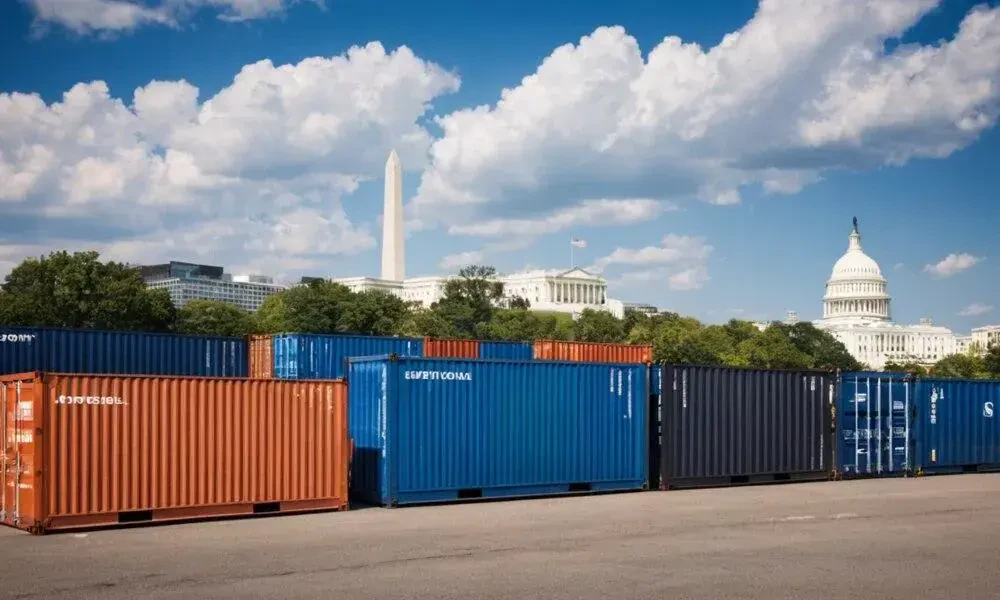
International Hauling
When relocating to a new country, the last thing anyone wants is to begin their new life with the lingering effects of a disastrous overseas move. As a result, as part of your pre-move planning, identify the top international relocating services in Washington, District of Columbia. To have a nice moving experience to another country, you must choose a renowned and capable hauling company.
Also, be sure the moving firm has a license from the Federal Maritime Commission (FMC), which issues licenses to foreign transportation companies. We are the ideal relocating company for you because of this. Not only are they licensed by the government, but they also have a long-standing reputation for providing reliable and efficient shifting services. With their experience and expertise, we are the go-to choice for anyone looking to move in or out of the Washington D.C. area. area. Whether it's a small apartment or a large office, we can handle any size of move with efficiency and professionalism.
Our 20+ years of expertise have taught us how to look after our customers and ensure that they are happy with their relocation. We’re also licensed to handle international transfers, so you can count on us to make your transition to or from Washington, DC a stress-free hauling experience. Our team of professional movers is well-equipped to handle all aspects of your move, from packing and loading to unpacking and organizing, ensuring that your belongings arrive safely and efficiently at your new destination. With our reliable and efficient services, we aim to provide a seamless relocating experience for all of our clients. Our team will handle every step of the process, from packing and loading to unloading and unpacking, ensuring that your move is stress-free and hassle-free.

Flat-rate and Hourly Services
The difference between an hourly price and a flat rate is determined by the distance your possessions must be relocated and the number of items at your existing residence. Additionally, the time of year can also impact the cost of hiring movers in Washington D.C., as peak moving seasons tend to be more expensive. It is important to research and compare different shifting companies to ensure you find the best option that fits your budget and meets your specific needs. Whether you're moving into or out of the nation's capital, hiring reliable and experienced haulers can make all the difference in ensuring a smooth and stress-free relocation.
The larger your property is and the more the distance your items must travel to reach their new location, the more expensive hourly movers get. If you’re shifting long distances, have a large property, or simply don’t want your moving fees to increase, ask your company for a flat charge. A flat charge can provide you with peace of mind and eliminate any surprise costs that may arise during the relocating process. Additionally, it can help you stick to your budget and ensure a smooth and hassle-free move to our nation's capital.
At Three Movers, our costs are transparent, and we provide the most cost-effective hauling service to our customers. All you have to do is allow us to assess your home on-site in order for our customer service representatives to provide you with an accurate quote. Our experts will handle all aspects of your move, from packing and loading to transportation and unloading, ensuring a seamless and stress-free experience for you.

Additional Services in Washington, District of Columbia
Packing and Crating

Before your move, Three Movers may assist you with packing any costly or fragile goods. Moreover, crating services are used by many of our customers who are shipping high-value items to or from Washington, DC. These specialized crates offer extra protection and security during the moving process, ensuring that valuable items such as artwork, antiques, and electronics arrive at their destination safely. Additionally, we often provide packing services to assist customers in an efficient and secure attitude, ensuring a stress-free experience for individuals and families as they settle into their new homes in the nation's capital.
Our staff is well-equipped to handle these delicate items, and we can also provide specialized boxes to keep your things safe and secure during the move. Our team of experienced shifters is dedicated to ensuring a smooth and efficient shifting process, allowing you to focus on settling into your new home in Washington D.C. Our team of experienced movers understands the unique challenges that come with navigating the city's busy streets and tight parking spaces, ensuring that your belongings arrive safely and on time.
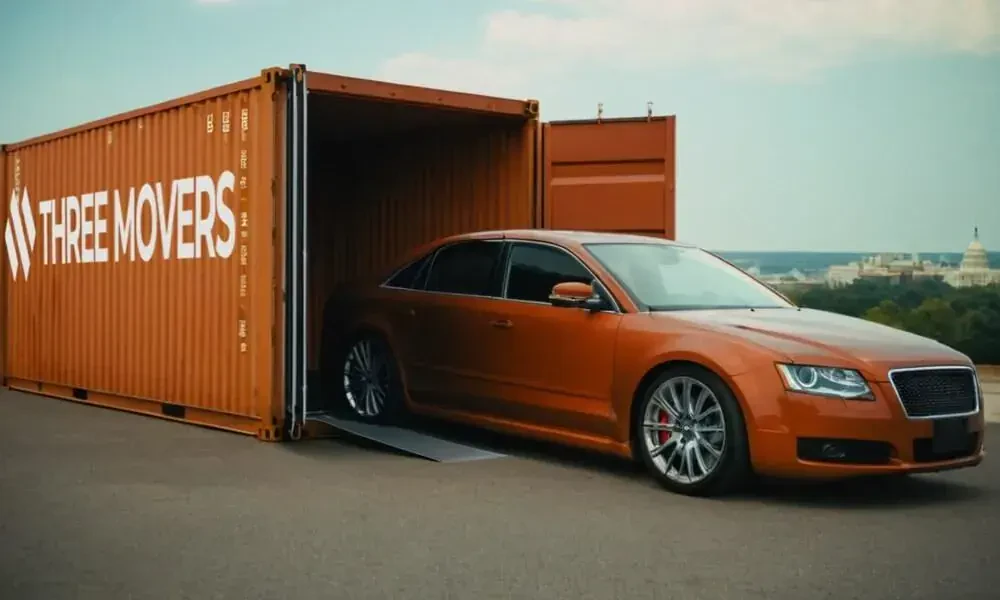
Auto Transport
We will assist you with automobile transportation to or from Washington, DC. Many long-distance movers, particularly those with multiple cars, choose to have their vehicles transported with their furniture and personal items. This has a number of advantages. You won’t have to drive several vehicles and won’t be subjected to the wear and tear that a long-distance transfer generally entails. It also addresses a problem you would have faced during the relocation. Please do not hesitate to contact us if you require automobile transportation to your new residence. Our experts are dedicated to providing exceptional service and ensuring a smooth transition for your move to or from the nation's capital. Situated just a short distance from the center of Washington D.C., our team of highly skilled and professional Chevy Chase movers is ready to assist you with all aspects of your relocation. Our team is dedicated to ensuring the safe and efficient handling of your belongings during the relocating process.
When planning your next move, choosing the best moving company ensures a smooth and stress-free experience. Our team proudly serves multiple Service Areas, providing personalized solutions that cater to each client’s unique needs. For helpful tips and guidance, explore our Moving Resources, designed to make every step of your relocation easier and more efficient.
Secure Storage Solutions: Combining Moving & Storage under One Roof
When it comes to a seamless relocation, combining moving and storage under one roof is a game-changer. Our Washington movers understand that sometimes clients require more than just transportation—they need a secure and reliable storage facility to bridge the gap between their current residence and their new house. Whether you are downsizing from a bedroom apartment, relocating across state lines, or planning a long-distance moving project, having a centralized solution ensures customer satisfaction and peace of mind.
Our storage units are equipped to handle all types of belongings, from furniture to delicate collectibles, ensuring utmost care every step of the way. Instead of juggling separate providers, our clients benefit from an all-in-one system where moving costs are transparent, your items are safe, and every move is coordinated flawlessly. By integrating storage with our delivery service, we provide a continuity that few other storage companies in the United States can match. You can schedule your move or last minute storage requirements, confident that your belongings are protected until you’re ready for the next stage of your move. For a free estimate and a moving plan tailored to your unique needs, CHOOSE US and experience a stress-free move in the Evergreen State, Washington State, or any of the surrounding areas.
Packing, Crating & Fragile‑Item Transport: Protecting What Matters Most
Packing is more than just placing items in boxes—it’s an art that ensures your fragile items arrive safely at their destination. Our professional moving company excels in professional packing, crating, and handling of delicate belongings such as electronics, artwork, and a pool table. Washington Moving experts understand that every move carries unique challenges, especially when navigating tight city streets or transporting items across state lines.
From bedroom apartment essentials to high-value antiques, we handle each item with great care and utmost care. Our unpacking services ensure that once your shipment arrives, items are carefully placed exactly where you want them, making the transition into your new house effortless. By offering Moving Quotes through our website or via Phone Number, we help clients understand moving costs upfront, ensuring transparency. Whether you are planning a big move in New York, a state move, or interstate moves from Los Angeles or Gig Harbor, our top movers combine great experience, attention to detail, and exceptional work ethic to provide a stress-free move.
Furniture Shifting, Heavy Lifting & Specialty Moves: We Handle the Hard Stuff
Moving heavy or specialty items requires skill, precision, and the right equipment. Our best movers specialize in furniture assembly, transporting bulky pieces, and managing complex items such as pool tables or fragile custom furniture. Whether it’s a local relocation within Washington, DC, a state move, or long-distance moving, our team ensures that every lift is executed with great care and efficiency.
For clients planning a big move, handling cumbersome items alone can be risky and exhausting. Our local moving company and Washington Moving teams offer delivery service for heavy loads and coordinate every step of the process. By integrating our expertise with a moving plan tailored to your unique needs, we ensure a smooth transition from your current home to your new house, whether in the Evergreen State, New York, or other parts of the United States. With moving costs clearly communicated and a free estimate available via our website or Phone Number, you can rely on every move being executed flawlessly. Trust our top movers for a great experience, a great job, and a stress-free move that makes even the hardest part of relocation feel effortless.
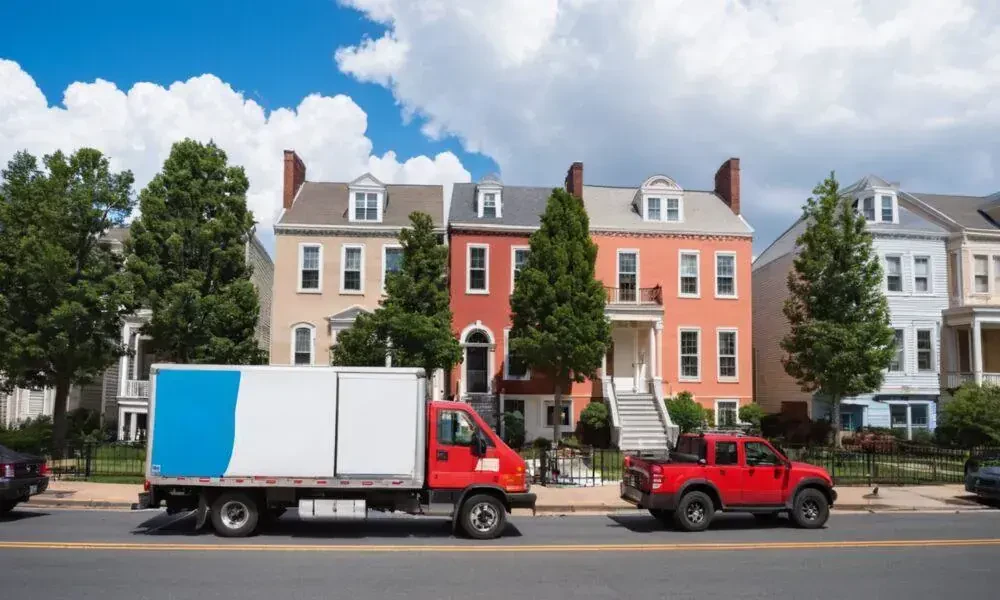
Same-day Shifting
We are one of only a few moving firms that provide same-day services. We understand how difficult it can be to find a competent and trustworthy moving company on short notice. This is why we provide same-day emergency moving services.
Despite the fact that most relocations are arranged in advance (which we strongly encourage), we have a moving team on standby to assist in the event of an emergency relocation. Whether you're shifting to or from the state of Washington D.C., our team is equipped to handle all your relocation needs with efficiency and care.

Insurance
Three Movers, like all other movers, is unable to provide insurance for your move to or from Washington, D.C. on its own. However, Federal law allows us to present certain “valuation” options to our customers. These valuation options provide our customers with added peace of mind knowing that their belongings are protected during the moving process. Whether it's basic coverage or full-value protection, we prioritize the safety and security of every item they transport. We are highly trained professionals who handle each item with care and precision, making sure to wrap and secure them properly to prevent any damage during the relocating process. With our haulers, you can rest assured that your belongings are in good hands. Our professionals take every precaution to protect your items and ensure a smooth and efficient move.
Insurance protects your possessions from damage while in transportation, whereas valuation refers to the level of responsibility a moving company bears if your belongings are lost or destroyed during a relocation. Contact your company for additional information about insurance. Moving to Washington D.C. can be an exciting and daunting task, but with the help of professional haulers, the process can be made smooth and efficient. Whether you are shifting within the city or relocating from another state, we are equipped to handle all your moving needs. With their expertise in navigating the city's busy streets and knowledge of the best routes, you can trust that your belongings will be transported safely and on time.

Full-Service Shifting
Our customers may count on Three Movers to deliver full-service moving. This process includes locating boxes and packing supplies, carefully packing your possessions, transporting your belongings to the new location, and unloading and reorganizing your belongings. To put it another way, hiring our full moving services enables us to organize your relocation meticulously. As a result, you may relax and focus on other things while we handle the moving logistics. Our professionals will ensure that your belongings are carefully packed and transported to your new location without any hassle. Trust us to make your move smooth and stress-free. With years of experience and a team of trained professionals, these haulers are well-equipped to handle all aspects of your move, from packing and loading to transportation and unpacking. Whether you are shifting within the city or relocating to or from the nation's capital, our workers are experts in handling all aspects of your move to ensure a seamless and stress-free experience. From navigating the city's busy streets to implementing strict safety protocols, these professional haulers are equipped with the knowledge and tools necessary to ensure a smooth and secure relocation experience for their clients. From carefully packing and loading belongings to navigating traffic and parking challenges, we strive to provide efficient and stress-free shifting services in the nation's capital.
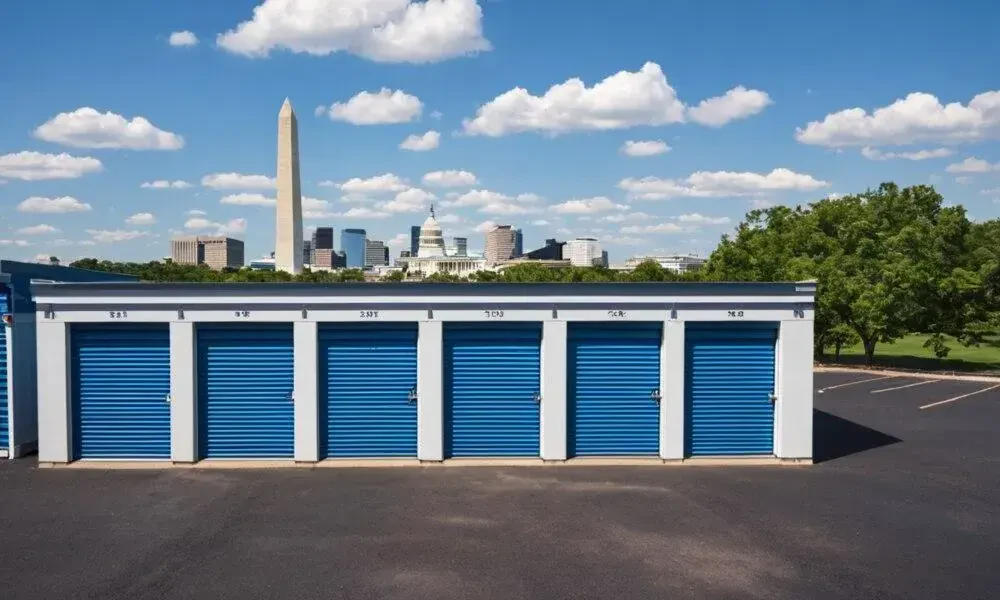
Storage Services
When moving, some people opt to store part of their belongings. It’s mostly because they want to relocate over a great distance. They also prefer to move the majority of their belongings once they’ve settled into their new residence. As a result, Three Movers now offers storage to its customers, allowing you to combine moving and storage services and handle the entire process through one firm rather than dealing with storage and moving companies differently. This convenience is particularly valuable for residents and businesses in Washington D.C., as the city's bustling nature often demands efficient and streamlined moving solutions. With the convenience of having both moving and storage services in one place, customers can have a seamless and stress-free experience.
Cost & Time Examples For Shifting To Or From Washington DC
| To / From Washington DC | Distance (Miles) | 2BHK Min-Max Cost ($) | 3BHK Min-Max Cost ($) | 4BHK Min-Max Cost ($) |
|---|---|---|---|---|
| Houston, TX to Washington DC | 1200 | $2,500 - $4,500 | $3,500 - $6,000 | $4,500 - $8,000 |
| Los Angeles, CA to Local Area | 2700 | $3,000 - $5,500 | $4,000 - $7,500 | $5,000 - $9,000 |
| Chicago, IL to The Area | 700 | $2,000 - $3,500 | $2,500 - $4,500 | $3,000 - $5,500 |
| New York, NY to Washington DC | 225 | $1,500 - $2,500 | $2,000 - $3,500 | $2,500 - $4,500 |
| Miami, FL to City Limits | 1000 | $2,000 - $3,500 | $2,500 - $4,500 | $3,000 - $5,500 |
| Denver, CO to Washington DC | 1500 | $2,500 - $4,000 | $3,000 - $5,000 | $4,000 - $7,000 |
| Seattle, WA to City Limits | 2800 | $3,000 - $5,500 | $4,000 - $7,500 | $5,000 - $9,000 |
| Boston, MA to The Area | 400 | $1,500 - $2,500 | $2,000 - $3,500 | $2,500 - $4,500 |
| Atlanta, GA to Washington DC | 600 | $1,500 - $2,500 | $2,000 - $3,500 | $2,500 - $4,500 |
| Phoenix, AZ to Local Area | 2300 | $3,000 - $5,000 | $4,000 - $6,500 | $5,000 - $8,000 |
*Prices and times are estimated. They can vary depending on the season and other factors. Get a quote custom-tailored to you.
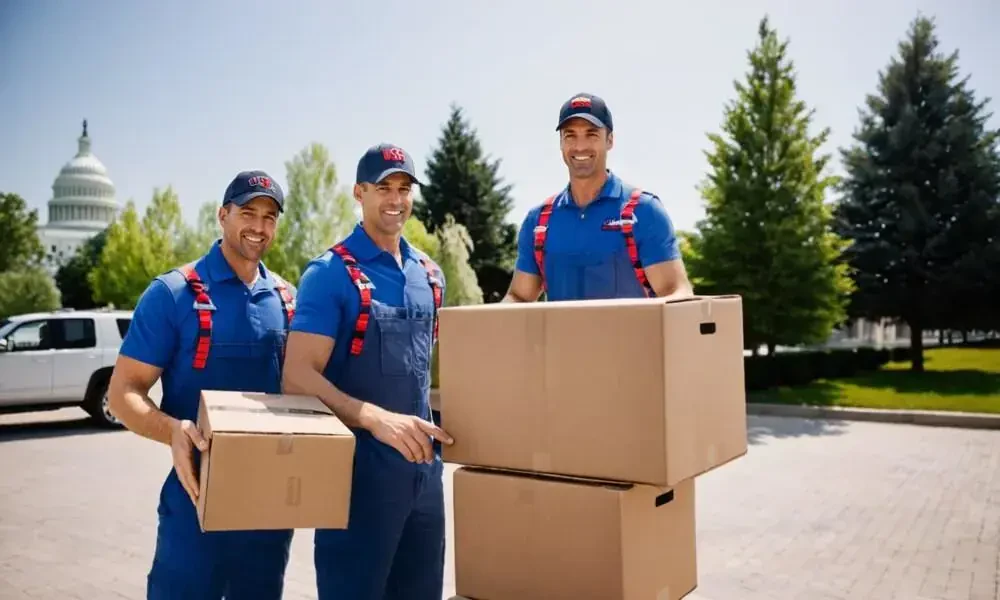
Are You Ready To Work With Three Movers?
Fill out our simple form and get your free quote in a matter of minutes. custom-tailored to you.
Relevant Statistics
- Over 80% of residents in Washington D.C. use professional haulers when relocating.
- The average distance traveled by movers in Washington D.C. is approximately 20 miles.
- There are more than 150 licensed and insured relocating companies operating in the metropolitan area.
- Around 95% of customers who hire professional haulers report being satisfied with their services.
- The peak season for moving in Washington D.C. is during the months of June and July, with over 40% of moves occurring during this period.

General Facts
- Washington D.C. shifters provide professional assistance in relocating homes and offices within the city.
- They offer services such as packing, loading, transportation, and unpacking of belongings.
- We ensure the safety of items during the moving process.
- Some companies specialize in long-distance or international moves.
- Hiring professional haulers can save time and effort, making the shifting process more efficient and stress-free.
Resources
Popular Routes
| DC to Baltimore | Philadelphia to Washington DC |
| Boston to D.C. | Chicago to DC |
| N.Y. to D.C. | DC to Atlanta |
| New York to Washington DC | DC to MD |

Frequently Asked Questions
Local Washington movers generally range from $450–$1,200 for apartments and $1,000–$2,500 for larger homes. Costs shift with move size, 2–4 movers, packing, rowhouse stairs, elevator reservations, parking permits, and traffic on roads like New York Avenue and I-395. Interstate moves to nearby states usually require an FMCSA-regulated carrier and may run $1,500–$6,000+ depending on mileage and delivery windows. For planning, use our moving prices reference at the moving cost calculator.
Phone or online estimates from DC moving companies are usually 80–95 percent accurate when inventory details are complete. On-site or virtual surveys provide the highest accuracy because they confirm stairs, loading zones, long-carry distances, and building management rules in high-rise areas such as Navy Yard or Columbia Heights. Seasonal demand and last-minute changes can affect totals. For verified rates, many households begin with a local moving service estimate.
Washington movers classify most trips within DC, Northern Virginia, or suburban Maryland as local, often under 50–100 miles. Moves farther within the region but still within the same state are intrastate and may require specific state permits. Any move state-to-state (for example DC to Virginia or Maryland) becomes interstate and must follow FMCSA rules, including carrier DOT number verification. Delivery timing, weight, and mileage influence cost.
Movers cannot transport flammables, explosives, chemicals, paints, propane, or anything restricted by federal guidelines. Most DC buildings also prohibit moving open liquids, live plants, and certain perishables. Firearms typically require separate handling. These rules help protect crews, elevators, and tight loading docks common in downtown neighborhoods. Always review the non-allowables list during booking, especially if requesting a full service move.
Peak demand for Washington movers occurs June–August, when pricing and elevator reservations tighten. Spring and fall often offer steadier rates and less congestion. Plan 2–4 weeks ahead for local DC moves and 4–8 weeks for interstate relocations. Building requirements, freight-elevator windows, and weekend traffic around Dupont Circle or Capitol Hill also influence scheduling. Early morning arrivals reduce congestion and improve loading efficiency.
Yes. Many movers provide containerized or warehouse storage for periods from a few days to multiple months. Pricing is tied to unit size, climate control needs, inventory weight, and access frequency. DC-area customers often use storage while waiting for co-op board clearance or apartment turnover dates. For integrated pickup, storage, and redelivery, review our moving storage options.


